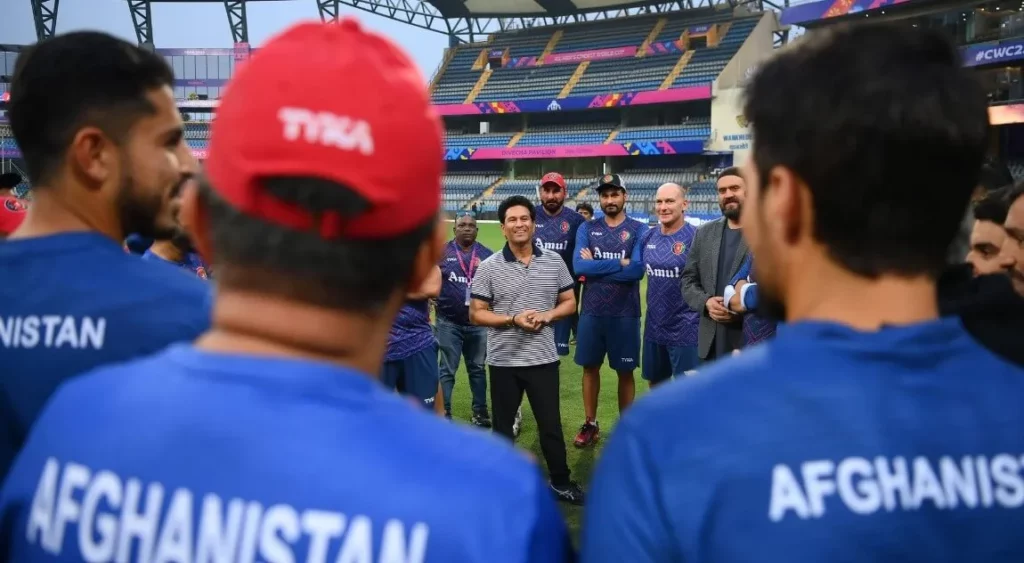
As the sun descended on the vibrant city of Mumbai, the cricketing world witnessed a spectacle of skill and determination at the Wankhede Stadium. It was Ibrahim Zadran, an emerging star from Afghanistan, who took center stage, crafting a masterpiece of an innings that would be etched in World Cup lore. This historic performance was not merely a display of talent and technique; it was a reflection of the profound impact that Sachin Tendulkar, the legendary Indian cricketer and a global ambassador for the sport, had on this young prodigy. Zadran’s century, the first ever by an Afghan at this level, bore the hallmark of Tendulkar’s strategic insights and inspirational ethos.
The match that unfolded was more than a contest of runs and wickets; it was a narrative of mentorship coming to fruition. Zadran, with a poised stance and a clear mind, seemed to channel the essence of Tendulkar’s wisdom with every stroke he played. There was a palpable sense that the advice given by the ‘Master Blaster’ himself had catalyzed a transformation in Zadran. The innings not only elevated his stature as a cricketer but also served as a beacon of hope and ambition for an entire nation passionate about the game. Afghanistan’s cricket team, once viewed as underdogs, was now redefining their story, and Zadran’s blade was their pen.
Zadran’s Rise to Prominence
Within the storied walls of the Wankhede Stadium—under the silent gaze of Sachin Tendulkar’s imposing statue—Ibrahim Zadran found the resolve and inspiration to construct an innings that would forever change the cricketing fortunes of Afghanistan.
Afghanistan’s Leap in the World Cup:
- Before this landmark event, the team savored a solitary win in World Cup history dating back to 2015;
- The current campaign has been a revelation, with the team securing victories in four out of seven matches, three of which were consecutive triumphs, positioning them as contenders for the semi-finals.
The Influence of a Legend
The night preceding the match against Australia, Tendulkar imparted his vast reservoir of cricket knowledge to the Afghanistan team, leaving an indelible mark on their strategy and confidence. The subsequent innings from Zadran was not only a personal milestone but a collective high for Afghanistan, propelling them to their highest total in World Cup competition.
Crafting a Memorable Innings
Ibrahim Zadran’s journey to his unbeaten 129 runs was a reflection of several elements shared during his interaction with Tendulkar, who once graced the very grounds as a ball-picker before his illustrious international career.
Zadran’s Acknowledgment of Tendulkar’s Guidance:
- The candid exchange with Tendulkar provided Zadran with a wealth of cricketing acumen that transcended mere technique;
- Tendulkar’s humble beginnings and monumental achievements offered a template for success that Zadran was eager to emulate.
Zadran set out to mirror Tendulkar’s legacy, an ambition that came to fruition against the formidable Australian team, as he credits the surge in confidence and energy to the insights shared by Tendulkar.

The Essence of Tendulkar’s Advice
Tendulkar’s guidance focused on a minimalist, moment-to-moment approach to batting. He emphasized the importance of playing each ball on its merits without being burdened by the weight of expectations for large totals. His counsel underscored the necessity of adapting to the game’s evolving scenarios and relying on one’s natural instincts when in command at the crease.
Key Aspects of Tendulkar’s Advice:
- Recognizing and adapting to the flow of the game;
- The significance of selective aggression and the timing of an attack;
- Trusting one’s natural game and focusing on the immediate challenge posed by the bowler.
A Performance Reflecting Tendulkar’s Wisdom
Zadran’s innings were a masterclass in measured aggression and situational awareness, qualities that mirrored Tendulkar’s ethos. The result was a defining performance that not only underscored Afghanistan’s competitive spirit at the Wankhede but also highlighted the enduring legacy of Sachin Tendulkar’s influence on the sport.





















